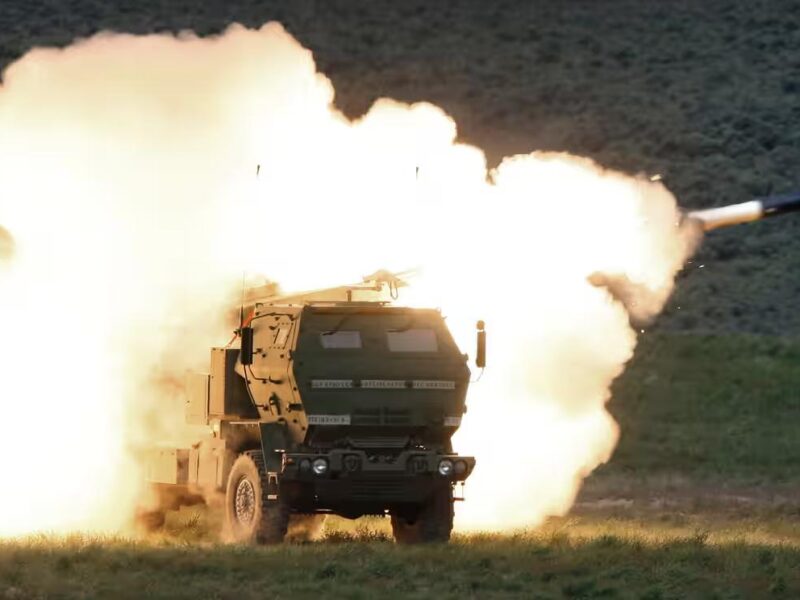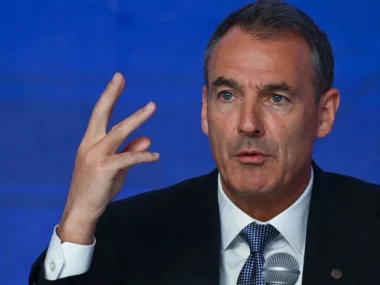Oleksandr Kamyshin wants to increase weapon exports by revitalizing the public sector and coordinating private businesses.
The man in charge of restoring Ukraine’s domestic armaments sector, Oleksandr Kamyshin, has big plans for the future of his nation. According to him, Ukraine ought to concentrate on producing armaments even after the conflict with Russia is ended, transforming into the “arsenal of the free world” and producing weaponry for sale.
“Ukraine’s primary industry should be defense throughout the ensuing decades. In a recent interview, Kamyshin stated, “It should be our main export product after the war,” at his office in an unmarked building in the heart of Kiev.
As the head of Ukraine’s state railway network at the outset of the conflict, Kamyshin garnered praise for the way he and his team coordinated efforts to move millions of migrants to the country’s western borders.
He was named minister of strategic industries by Volodymyr Zelenskiy, the president of Ukraine, in March. According to Kamyshin, the moniker is misleading because there should only be one strategic industry in the nation at this time.
In order to try to ensure that the army obtains what it needs, it is his responsibility to communicate with the army, the defense ministry, and the 70 state-run defense companies in Ukraine. Generals have expressed dissatisfaction about a persistent lack of weaponry and ammunition, despite receiving supplies from the West, which hinders their ability to drive the Russians farther back.
Despite the years of low-grade fighting in Donbas, Ukraine’s armaments stockpiles were relatively small when the full-scale invasion occurred last year. Prior to the full-scale invasion last February, the country’s arms business was a shadowy realm of scandals and questionable agreements.
Kamyshin remarked, “We had a few Javelins, but mostly Soviet stocks.” The year prior to the invasion, 2021, saw the production of zero ammunition in Ukraine, according to a defense official.
In addition to coordinating the numerous tiny private companies that have emerged to produce weapons for the Ukrainian army—from large corporations to a few individuals tinkering in a shed—Kamyshin now seeks to revitalize the state sector. According to Kamyshin, there are currently over 200 Ukrainian companies producing drones, and there are many more with exciting concepts.
He declared, “This year’s capabilities volume is three times larger than last year’s.” “In 2021, the state governed 80% of the sector; today, that percentage is at 50%. It should be 80/20 in favor in five years.
In the long run, Ukrainian officials hope to draw in foreign manufacturers to produce in their nation. With this appeal, Kamyshin expects that a Washington meeting on arms production will be beneficial. Leading Ukrainian officials and businesses will be present at the conference, which is being organized by the US National Security Council, along with representatives from western governments and the major armament manufacturers in the world, on December 6 and 7.
“Usually, you have to invest $10 billion or more to do anything with big arms companies, and then they might localize some production,” Kamyshin said, citing Poland’s recent purchase of nearly 500 Lockheed Martin Himars missile launchers, which will allow the arms giant to establish a manufacturing base in Poland. However, we may demonstrate our inventiveness. We use western launchers to deliver Soviet missiles. These individuals saw our creative abilities,” he remarked.
The ability to test weaponry right away is an additional inducement. Mykhailo Podolyak, a Zelenskiy aide, stated, “Our partners would get better quality weapons, after they were tested out in real battle conditions, not just in experimental conditions.”
According to Kamyshin, once the war is over, Ukraine can use its newly acquired technology to mass-produce and export weapons, depriving Russia of many of its traditional export markets. Currently, all production in Ukraine is focused on meeting the needs of the Ukrainian army.
“We can tell them that we are capable of converting from Soviet to NATO standards. “Come along with us, and we’ll impart the knowledge we’ve gained to you. You’ll convert to NATO standards,” Kamyshin declared.
In fact, he asserted that the nation’s calling card for decades to come may be its arms exports. “We want to rebrand as the arsenal of the free world. We were previously known as the breadbasket of Europe.”
Although it is obvious that Ukraine currently needs guns badly, many people find it dismal to think that the country may one day produce weapons and supply weaponry to wars throughout the world. Kamyshin is not in agreement. My spouse also says that to me. I inform her that these are the tools that keep us safe,” he uttered.











